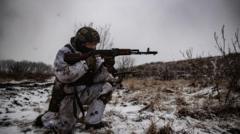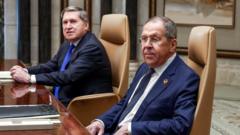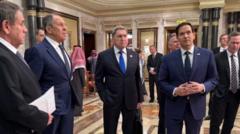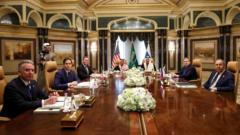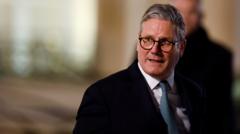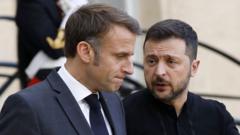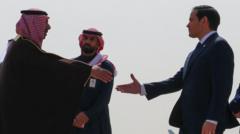U.S. Defense Secretary Pete Hegseth remarked that President Trump's conversation with Russian President Vladimir Putin is not a betrayal of Ukraine, even as European leaders express concern about its implications for Kyiv’s role in upcoming negotiations. Hegseth emphasized the need for a peaceful resolution and urged NATO allies to increase military spending.
U.S. Defense Secretary Defends Trump's Call with Putin Amid Concerns for Ukraine’s Involvement

U.S. Defense Secretary Defends Trump's Call with Putin Amid Concerns for Ukraine’s Involvement
In a recent defense meeting, U.S. Secretary Pete Hegseth supported Trump's communication with Putin, allaying fears of sidelining Ukraine in peace discussions despite no Ukrainian officials being present.
The U.S. defense secretary, Pete Hegseth, recently stood by President Trump's dialogue with Russian President Vladimir V. Putin, claiming that it was "no betrayal" of Ukraine, despite the absence of Ukrainian representatives from the conversation. The call, which took place on Wednesday, marks the first interaction between the two leaders since Trump reassumed the presidency last month and has triggered anxiety among European leaders who worry that Ukraine may be excluded from vital peace negotiations.
During his arrival at a NATO defense ministers' meeting in Brussels, Hegseth stated, "There is no betrayal there," emphasizing the global commitment to a negotiated peace. He indicated that Trump's leadership is essential in galvanizing the necessary powers for peace talks. Concerns surrounding the call stem from past Ukrainian and European assertions that any discussions about the end of the war should include Ukrainian voices. NATO Secretary-General Mark Rutte reinforced this notion upon his arrival at the summit, underscoring the importance of Ukraine's participation in all negotiations regarding its future.
In light of the ongoing conflict, Hegseth gradually retracted previous statements about U.S. support for Ukraine's NATO ambitions as part of a peace strategy, considering a return to pre-2014 borders "unrealistic." He called on NATO member states to elevate their defense budgets from 2% of GDP to 5%, pushing for Europe to take a more substantial leadership role in ensuring security.
Hegseth's comments offered a degree of reassurance to NATO allies, many of whom were unsettled by Trump's earlier indications that the U.S. might disengage from the alliance. He reaffirmed America's commitment alongside its NATO partners, reiterating the importance of strength to help resolve the ongoing conflict in Ukraine.



